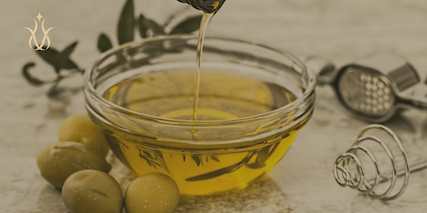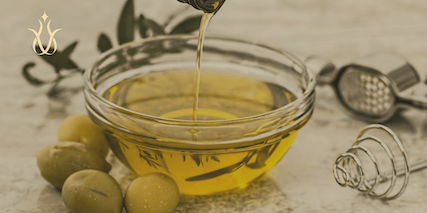Olive oil, a cornerstone of the Mediterranean diet, is celebrated for its versatility and flavour and its numerous health benefits. This detailed guide examines the remarkable ways olive oil can bolster your health, highlighting its rich monounsaturated fats that help reduce heart disease risk, control blood sugars, and lower cholesterol levels. Discover the antioxidant properties of olive oil that protect against cellular damage and its anti-inflammatory effects that can alleviate conditions like arthritis. We also explore how olive oil contributes to healthier skin and hair. Learn about the different types of olive oil, their unique benefits, and tips for choosing, storing, and cooking with olive oil to preserve its health properties.
Introduction
Have you ever wondered why olive oil is often hailed as the ‘liquid gold’ of the culinary world? The answer lies in its rich history and, more importantly, its impressive health benefits. Used for thousands of years, olive oil has its roots steeped in the Mediterranean region and is considered a vital ingredient of the age-old Mediterranean diet. It has shaped culinary traditions and proved to be an essential aspect of overall health and longevity in these regions. In this article, we will dive deeper into the beneficial effects of olive oil and why it’s considered a powerhouse of nutrients.
Nutritional Profile of Olive Oil
Olive oil’s reputation as a health-promoting food is primarily due to its impressive nutritional profile. It’s rich in monounsaturated fats, particularly oleic acid, which comprise around 73% of the total oil content. Monounsaturated fats are known for their heart-healthy properties and are crucial to a balanced diet.
Moreover, olive oil contains vitamins E, and K. Vitamin E acts as a powerful antioxidant, protecting your cells from damage caused by free radicals, while vitamin K plays an essential role in blood clotting and bone health. A single tablespoon of olive oil provides about 14% of the daily recommended intake of vitamin K and about 10% of the daily recommended intake of vitamin E.
However, the presence of polyphenols sets olive oil apart from other vegetable oils. Polyphenols are potent antioxidants with numerous health benefits, including anti-inflammatory and antimicrobial properties. These polyphenols are abundant in olive oil, further enhancing its health profile.
Extra Virgin Olive Oil
Extra Virgin Olive Oil, often abbreviated as EVOO, is much more than a fancy addition to your kitchen counter. Its name might sound extravagant, but the benefits it brings to your plate and health are truly remarkable.
Being the highest quality olive oil, EVOO is unrefined, meaning it’s made purely from cold-pressed olives without any added chemicals or heat, which can alter the flavour and nutrient profile. This cold pressing ensures that EVOO retains the maximum amount of nutrients from the olives, including heart-healthy monounsaturated fats, inflammation-fighting antioxidants, and vitamins E and K.
A unique feature of EVOO is its abundance of bioactive compounds, most notably oleocanthal. This natural phenolic compound has been found to possess anti-inflammatory properties similar to those of ibuprofen, a commonly used over-the-counter anti-inflammatory drug. This could potentially contribute to the reduction of inflammation-related diseases, such as heart disease and arthritis.
Moreover, EVOO is rich in polyphenols. These antioxidants have been shown to contribute to heart health by reducing blood pressure and LDL cholesterol levels. A diet high in EVOO has also been associated with improved brain health and a lower risk of cognitive decline.
In the following sections, we’ll explore the diverse health benefits these nutrients in olive oil offer. From heart to brain health and weight management to inflammation reduction, olive oil is a remarkable asset for our well-being.

Olive Oil and the Mediterranean Diet
Olive oils are a central ingredient in the Mediterranean diet, which is known for its robust connection with longevity and lower disease rates. Rooted in the traditional foods and culinary patterns of countries along the Mediterranean Sea, this diet is rich in fruits, vegetables, whole grains, fish, and, most notably, the abundant use of olive oil.
Olive oil is not merely a dietary component in these regions but a way of life, contributing immensely to the sensory experience of food while bringing significant health benefits. It is the primary source of added fat in the Mediterranean diet and is used for sautéing, grilling, baking, salad dressings, and even as a topping on salads, roasted vegetables and bread.
What makes this diet truly stand out is the scientific backing it has received over the years. Numerous studies have shown that the Mediterranean diet can lead to weight loss, reduce heart attacks, strokes, and death from heart disease, and prevent type 2 diabetes. One of the largest and most recognised studies is the PREDIMED trial, which highlighted that a Mediterranean diet supplemented with extra virgin olive oil reduced the incidence of major cardiovascular events among persons with a high cardiovascular risk.
This association between the Mediterranean diet, olive oil consumption, and better health outcomes is not coincidental. The following sections will shed light on the specific beneficial health effects of olive oil, underpinning why it’s a dietary mainstay in one of the healthiest eating patterns globally.
The Benefits of Olive Oil: Heart Health
Olive oil, specifically extra virgin olive oil, is a heart-friendly addition to any diet. Its ability to promote heart health is derived from its unique nutritional profile, particularly its abundance of monounsaturated fats and potent antioxidants.
The primary fatty acid in olive oil, oleic acid, accounts for about 73% of the total oil content and is a monounsaturated fatty acid. Monounsaturated fatty acids are considered heart-healthy dietary fats as they help lower your bad (LDL) cholesterol levels, which in turn can lower blood pressure and lower the risk of heart disease and stroke. Furthermore, they also provide nutrients that help develop and maintain your body’s cells.
Olive oil is also rich in polyphenols, antioxidant compounds that combat oxidative stress and inflammation, which are linked to heart disease risk. These antioxidants are key players in olive oil’s heart-protective qualities, helping to maintain the integrity of blood vessels, prevent the oxidation of LDL cholesterol, and lower blood pressure.
Numerous studies support olive oil’s cardiovascular benefits. A landmark trial, the PREDIMED study, found that individuals at high cardiovascular risk who supplemented their diet with extra virgin olive oil had a 30% lower risk of major cardiovascular events like stroke and heart attack.
Another observational study involving thousands of participants in Italy found that those who consumed more than two tablespoons of olive oil daily had a 13% reduced risk of heart disease and a 21% lower risk of stroke.
The Benefits of Olive Oil: Brain Health
Olive oil is not just heart-friendly, it also supports brain health. Its high content of monounsaturated fats and antioxidants, especially polyphenols, can play a role in cognitive health, potentially reducing the risk of Alzheimer’s disease and other forms of dementia.
Monounsaturated fats found in olive oil have been associated with better brain health. A study published in the Annals of Clinical and Translational Neurology found that higher monounsaturated fatty acid intake was associated with greater general intelligence and the organisation of the brain’s attention network.
Another intriguing component of olive oil is a polyphenol called oleocanthal. This compound has attracted scientific interest due to its potential neuroprotective properties. A 2013 study published in ACS Chemical Neuroscience demonstrated that oleocanthal can help clear the brain of amyloid-beta plaques and tau tangles, hallmarks of Alzheimer’s disease.

The Benefits of Olive Oil: Skin and Hair Health
The goodness of olive oil extends beyond your internal health to your external well-being, particularly when it comes to skin and hair health. This is largely due to its high content of antioxidants and healthy fats.
Antioxidants in olive oil, such as vitamin E, protect the skin from oxidative stress, one of the major causes of skin ageing. Meanwhile, the healthy fats in olive oil can moisturise the skin, reduce inflammation, and assist in skin repair. This makes olive oil a useful natural remedy for various skin conditions, including eczema and psoriasis.
Olive oil is equally beneficial for hair health. It nourishes and conditions the hair helps combat dryness, reduces frizz, and even promotes scalp health. A 2015 study published in the Journal of Cosmetic Dermatology suggests that applying olive oil to the hair can improve its lustre and flexibility.
Incorporating olive oil in your skincare and haircare routine can be as simple as applying it directly to the skin or hair or mixing it with other beneficial ingredients for a DIY treatment. Always remember to use extra virgin olive oil for the best results.
The Benefits of Olive Oil: Digestive Health
As we explore olive oil’s beneficial effects further, you’ll be intrigued to learn that it is not only heart-friendly but also beneficial for your digestive system.
Olive oil, a principal component of the Mediterranean diet, is rich in monounsaturated fats. These fats promote food’s smooth passage through the digestive tract. This natural lubricant aids digestion, benefiting those experiencing digestive discomfort or bloating.
But that’s not all. Olive oil may also improve gut health. The polyphenols in extra virgin olive oil positively affect the gut microbiota, increasing the proportion of beneficial bacteria and decreasing harmful bacteria. A healthy gut microbiota is essential for nutrient absorption and immune system function, adding to olive oil’s extensive health benefits.
The Benefits of Olive Oil: Diabetes
Let’s look at olive oil’s role in managing and preventing diabetes, a prevalent health issue worldwide. This golden liquid might hold the key to better blood sugar control.
Research has suggested that a Mediterranean diet rich in olive oil can help improve glucose metabolism and enhance insulin sensitivity. This means your body can better regulate your blood sugar levels, reducing the risk of type 2 diabetes. A pivotal study in the journal Diabetes Care found that a Mediterranean diet rich in olive oil reduced the risk of type 2 diabetes by more than 40% compared to a low-fat diet.
The Benefits of Olive Oil: Weight Management
When managing our weight, we often avoid fats. However, certain fats, like those in olive oil, can be true ally in our weight loss journey. Let’s delve into this counterintuitive yet scientifically backed concept.
As counterintuitive as it may seem, olive oil can aid in weight management. The key lies in the monounsaturated fats olive oil provides. These fats are slower to digest, helping to keep you feeling fuller for longer, thereby curbing unnecessary snacking and overeating.
Furthermore, the antioxidants and anti-inflammatory compounds present in olive oil, particularly extra virgin olive oil, may also assist in reducing weight gain. These substances can help fight chronic inflammation, which is often associated with obesity.
An enlightening study in the European Journal of Nutrition found that those consuming extra virgin olive oil as part of their regular diet had lower body weight and less abdominal fat than those not consuming olive oil. And it doesn’t stop there! A review published in Lipids in Health and Disease revealed that diets high in monounsaturated fats, such as the Mediterranean diet with olive oil as a key component, contributed to sustainable weight management.
The Anti-Inflammatory Properties of Olive Oil
As we delve deeper into olive oil’s beneficial effects, one key aspect emerges—its remarkable anti-inflammatory properties. Here’s how this “liquid gold” can help manage inflammatory diseases.
Olive oil, specifically extra virgin olive oil, is abundant in powerful bioactive compounds. One of the primary compounds is oleocanthal, a phenolic compound known for its potent anti-inflammatory effects. Fascinatingly, its action is similar to ibuprofen, a widely used anti-inflammatory drug.
Also worth mentioning is the antioxidant oleuropein, another key compound in olive oil, which has been shown to considerably reduce anti-inflammatory markers such as c-reactive protein. These compounds help mitigate the damaging effects of chronic inflammation, potentially reducing the risk of various inflammation-associated diseases.
A host of research studies support these benefits. For instance, a study published in the Current Pharmaceutical Design journal highlighted the role of olive oil phenolic compounds in modulating inflammatory markers and pathways.
The Benefits of Olive Oil: Arthritis
One particular area where the anti-inflammatory power of olive oil has been recognised is in the management of arthritis, a condition marked by chronic joint inflammation.
Regular consumption of olive oil may help alleviate arthritis symptoms. Monounsaturated fats and the anti-inflammatory and antioxidant compounds in olive oil are believed to reduce inflammation and oxidative stress, two factors strongly implicated in arthritis.
In a striking study published in the Journal of Nutrition, Health & Aging, olive oil consumption was associated with a decreased risk of developing rheumatoid arthritis. Furthermore, a study in the American Journal of Clinical Nutrition found that patients with rheumatoid arthritis who consumed a diet supplemented with olive oil experienced reduced pain and improved physical function.
With its anti-inflammatory properties, olive oil could be a beneficial addition to an arthritis management plan alongside traditional treatments.
The Potential Role of Olive Oil in Cancer Prevention
The story of olive oil is an engaging tale of nutrition and health. It combines delicious taste with a host of potential benefits, including the tantalising prospect of cancer prevention. Let’s delve into the research and understand how this golden liquid might shield us from this serious disease.
Polyphenols are plant-based compounds, and they’re abundant in extra virgin olive oil. Renowned for their antioxidant and anti-inflammatory properties, these substances are thought to protect our cells from damage, a process central to the development of cancer.
Recent scientific studies have further elucidated these properties. A study published in “Molecules” indicated that olive oil polyphenols could suppress the growth and proliferation of cancer cells in the breast, colon, and stomach. However, we need to tread lightly here. While the research is promising, it’s mostly conducted in laboratories or animal models. The step to full-blown cancer prevention in humans is a significant one, and we’re not quite there yet.
Further evidence comes from epidemiological studies. These large-scale investigations observe patterns of health and disease in populations. The Mediterranean diet, of which olive oil is a central component, is consistently associated with lower cancer rates, particularly breast and digestive system cancers. However, remember that these studies show associations, not direct cause-and-effect relationships. The reduced cancer rates could be due to a combination of lifestyle factors common in Mediterranean countries, not solely the intake of olive oil.

Olive Oil in Cooking
Incorporating cooking olive oil into your culinary endeavours can bring forth flavourful dishes and a slew of health benefits. Let’s discuss how you can utilise olive oil in your kitchen and why it’s a healthier alternative to other cooking oils.
Extra virgin olive oil (EVOO) is a magnificent choice for cooking, thanks to its beneficial compounds and high concentration of monounsaturated fat. Unlike saturated fat in other oils, monounsaturated fat is linked to improved heart health.
It’s worth noting that while virgin olive oils have a lower smoke point compared to some other oils, it’s still perfectly safe for most cooking methods, including sautéing, grilling, and baking. The smoke point, which refers to the temperature at which an oil starts to degrade and produce smoke, is around 375-410°F (190-210°C) for extra virgin olive oil. Therefore, it’s ideal for cooking at medium rather than high heat.
Choosing and Storing Olive Oil
While olive oil is widely available, choosing a high-quality product can substantially benefit your health. Here are some pointers on selecting and storing olive oil to ensure you get the best out of it.
When shopping for olive oil, look for those labelled ‘extra virgin’, which signifies the highest quality. The oil is extracted using natural methods and standardised for purity and sensory qualities like taste and smell. Also, check for certification or stamp on the olive oil labels from a reputable olive oil association, which confirms the oil’s quality and authenticity.
Storage is vital in maintaining olive oil’s quality. To prevent degradation, olive oil should be stored in a cool, dark place and used within six months to a year of opening. A dark glass bottle or stainless-steel container is ideal for storage, as it protects the oil from light and heat, which can cause rancidity.
With these tips in mind, you can make the most of the remarkable beneficial effects of olive oil.
Conclusion
Olive oil, particularly the extra virgin variety, is an impressive contributor to a healthy diet thanks to its rich nutrient profile and numerous associated health benefits. From supporting heart health to promoting brain function, aiding in weight management and possibly reducing the risk of certain chronic diseases, olive oil is indeed a “liquid gold” when it comes to nutritional assets.
The evidence-based benefits we’ve explored should give you a fresh perspective on this culinary staple. While olive oil can’t singlehandedly solve all health concerns, it plays a substantial part in a balanced, nutritious diet. So, the versatile olive oil can significantly contribute to your well-being, whether you’re drizzling it over a Mediterranean salad, using it to sauté vegetables, or even applying it to your skin.

Frequently Asked Questions
What is olive oil?
Olive oil is a liquid fat obtained from olives, a traditional tree crop of the Mediterranean Basin. It is produced by pressing whole olives and extracting the oil. Olive oil is commonly used in cooking, frying, and salad dressing. It is also used in cosmetics, pharmaceuticals, soaps, and as a fuel for traditional oil lamps.
Olive oil is rich in monounsaturated fats, especially oleic acid, which studies suggest may help reduce inflammation and may even benefit genes linked to cancer. The oil also contains vitamins E and K and is packed with powerful antioxidants. These antioxidants are biologically active and can help fight serious diseases.
There are several different types of olive oil, including extra virgin olive oil, virgin olive oil, and regular olive oil. Extra virgin olive oil is the purest and most healthful type, made from cold-pressed olives. Virgin olive oil, also from the first pressing, has a slightly higher level of acidity. Regular (or pure) olive oil, a blend of cold-pressed and processed oils, is lower quality and offers fewer health benefits.
How is olive oil made?
Olive oil is made through a relatively simple and natural process that has been employed for thousands of years. Here are the main steps:
- Harvesting: The process begins in the olive groves, where olives are harvested from the trees. This can be done by hand or with mechanical shakers that shake the olives off the trees.
- Cleaning: Once harvested, the olives are transported to a mill, where they are cleaned to remove any leaves, twigs, and other debris.
- Crushing: The cleaned olives, including their pits, are then crushed into a paste. Traditionally, this was done with stone mills, but modern methods use steel drums or hammer mills.
- Malaxation: The paste is then slowly churned or mixed in a process called malaxation. This step allows the small droplets of oil in the paste to aggregate and form larger droplets, making it easier to extract the oil in the next step.
- Extraction process: Centrifugation separates The oil from the solid paste. The paste is spun at high speeds in a centrifuge, separating the oil from the water and solid materials due to their different densities.
- Separation: Another round of centrifugation or decantation separates the oil from any remaining water and impurities.
- Bottling and Storage: The resulting olive oil is then stored in dark, temperature-controlled tanks until it’s ready to be bottled and sold. The oil should be protected from light, heat, and air, which can degrade its quality.
Extra virgin olive oil is made from the first pressing of the olives and without any chemical treatment, which is why it retains the most nutrients and flavour. Lower quality or refined olive oils, such as “light” or “pure” olive oil, are often extracted using heat or chemicals and may be mixed with other types of vegetable oil.
What are the main benefits of olive oil?
Olive oil, particularly extra virgin olive oil, boasts a multitude of health benefits due to its rich nutrient profile. Here are the primary health benefits associated with olive oil consumption:
- Heart Health: Olive oil is high in monounsaturated fats, especially oleic acid, which has been found to decrease levels of total blood cholesterol and low-density lipoprotein (LDL) cholesterol, often referred to as the “bad cholesterol.” Therefore, Regular olive oil consumption can contribute to cardiovascular health and potentially reduce the risk of heart disease.
- Anti-Inflammatory Properties: Olive oil contains antioxidants, most notably oleocanthal, which exhibits anti-inflammatory effects similar to ibuprofen, a common non-steroidal anti-inflammatory drug. This could potentially reduce the risk of chronic inflammatory diseases, such as arthritis and heart disease.
- Cancer Prevention: Several studies have suggested that the phenolic compounds present in olive oil might have a protective effect against certain types of cancer, particularly breast cancer and digestive tract cancers.
- Brain Health: Some research has shown that the phenolic components of olive oil can help decrease the risk of neurodegenerative diseases like Alzheimer’s.
- Digestive Health: Olive oil consumption can help improve digestion and overall gut health. It may reduce the risk of gastrointestinal disease and increase the absorption of nutrients.
- Weight Management: Contrary to the belief that fats should be entirely excluded from the diet when trying to lose weight, the healthy fats in olive oil can actually support weight loss and management. This is partly due to the satiety olive oil can provide, helping to reduce overall calorie intake.
- Bone Health: Preliminary studies suggest that olive oil can improve bone health by improving bone mineral density and strength.
- Skin and Hair Health: Olive oil is often used in skincare and hair care routines due to its moisturising properties. It can help combat dry skin, protect against skin damage, and give hair a shiny, healthy appearance.
How much olive oil should you take a day?
The recommended daily consumption of olive oil can vary depending on the source. According to the US Food and Drug Administration (FDA), consuming about 2 tablespoons (23 grams) of olive oil daily may reduce heart disease risk. You can use it in cooking, salad dressings, marinating vegetables, or drizzled over-cooked foods.
However, it’s essential to remember that olive oil is high in calories. While it has numerous health benefits, too much can lead to excessive calorie intake and potential weight gain.
Is olive oil good for your cholesterol?
Yes, olive oil is considered beneficial for managing cholesterol levels thanks to its high content of monounsaturated fats, especially oleic acid. These monounsaturated fats can help raise your levels of ‘good’ cholesterol (HDL cholesterol) while lowering ‘bad’ cholesterol (LDL cholesterol).
Additionally, a review of studies published in the Journal of Nutritional Biochemistry in 2015 noted that bioactive compounds in olive oil have positive effects on risk factors for heart disease, like high blood pressure and high cholesterol levels.
Is olive oil good for the liver?
Yes, olive oil is beneficial for liver health. This is largely due to its high content of monounsaturated fatty acids, particularly oleic acid, and antioxidants like vitamin E and polyphenols. These compounds can help reduce inflammation and oxidative stress and may even have protective effects against liver damage.
Research suggests that consuming olive oil can help reduce fat accumulation in the liver, promote healthy liver enzyme levels, and improve blood flow in the liver. In the context of fatty liver disease, a common liver condition, olive oil can be especially beneficial due to its ability to help improve insulin resistance and maintain a healthy weight.
Is olive oil good for blood pressure?
Yes, olive oil is indeed beneficial for blood pressure. Numerous studies have demonstrated that monounsaturated fats (particularly oleic acid), polyphenols, and other compounds present in olive oil can help lower blood pressure.
Research shows that regular consumption of olive oil, especially extra virgin olive oil, may help reduce systolic (the higher number) and diastolic (the lower number) blood pressure levels.
For example, a study published in the American Journal of Hypertension found that participants who consumed virgin olive oil had lower blood pressure compared to those who consumed sunflower oil. The virgin olive oil group also had a decreased need for antihypertensive medications.
Another study published in the Journal of Nutrition found that a diet supplemented with polyphenols from olive oil significantly reduced blood pressure in young women with high normal blood pressure or stage 1 hypertension.
Is it better to take olive oil in the morning or at night?
There’s no specific best time of day to consume olive oil that’s universally applicable, as it can depend on individual health goals and how your body responds to it.
However, some specific situations might benefit from timing the intake of olive oil.
- In the Morning: Some people find that taking a spoonful of olive oil on an empty stomach in the morning can aid digestion and relieve constipation. It’s also said to help kick-start metabolism for the day.
- At Night: Olive oil contains monounsaturated fats, which can help lower ‘bad’ LDL cholesterol levels. Taking it before bed might allow your body to process these beneficial fats overnight.
Can I take olive oil every day?
Yes, you can. Incorporating olive oil into your daily diet can be part of a balanced, healthy diet. As always, moderation is key.

What are the best brands of olive oil available in the US?
The best olive oil can differ based on individual preferences and intended uses. Nonetheless, there are a few brands that are consistently praised for their quality, taste, and commitment to maintaining the integrity of the olive oil. Here are a few popular brands available in the US:
- California Olive Ranch: This company is known for its high-quality extra virgin olive oils, all of which are certified by the California Olive Oil Council. They’re also committed to sustainable farming practices.
- Corto Olive: Corto is a family-owned business that harvests olives in a way that ensures the freshest and most flavourful olive oil. Their products are highly appreciated by both home cooks and chefs.
- Lucini Italia: This brand’s premium Select Extra Virgin Olive Oil is made using olives from family farms in Italy. It’s free of any additives or preservatives.
- Colavita: Colavita offers a wide range of olive oils, including extra virgin and organic. This brand is a staple in many kitchens across the US.
- La Tourangelle: This brand offers artisan oils, including a delicious extra virgin olive oil. The company is committed to quality and sustainability.
- Pompeian: Known for its robust flavour and smooth finish, Pompeian offers a variety of olive oil products, including extra virgin and organic options.
What are the best brands of olive oil available in the UK?
There are numerous high-quality olive oil brands available in the UK, each offering a unique blend of flavours. Here are some of the top ones:
- Filippo Berio: An Italian brand with a long-standing tradition of producing high-quality oils. Their extra virgin olive oil is a favourite among UK consumers for its versatility and rich flavour.
- Zaytoun: This UK-based social enterprise offers a selection of fair-trade, organic, and cold-pressed Palestinian extra virgin olive oils. They are widely praised for their unique flavour profile.
- Nudo: Nudo offers a ‘tree adoption’ service that lets you enjoy oil from your own adopted olive tree in Italy. This company’s extra virgin olive oil is known for its fresh and fruity notes.
- Belazu: Belazu’s range of olive oils includes early harvest extra virgin oil, which is collected and pressed within 24 hours for maximum freshness. Their oils are known for their rich, buttery flavours.
- Terra Creta: This award-winning Greek olive oil is known for its excellent quality. The company uses sustainable farming practices, and the olive oil has a fruity, slightly peppery taste.
- Seggiano: Seggiano offers a light, delicate, extra virgin olive oil that’s well-suited to a variety of dishes. Their olives are cold-extracted within 12 hours of being hand-picked, which helps to preserve the oil’s delicate flavours.
Always look for olive oil that is labelled ‘extra virgin’ for the highest quality, and consider the source of the olives and the date of harvest.
It’s important to note that even though an olive oil may be more expensive, it doesn’t always guarantee it’s better.
Resources:
Heart.org (2022). The benefits of adding a drizzle of olive oil to your diet. Available at: https://www.heart.org/en/news
Harvard Health (2021). Is extra-virgin olive oil extra healthy? Available at: https://www.health.harvard.edu/nutrition
Jimenez-Torres at al (2021). Mediterranean Diet Reduces Atherosclerosis Progression in Coronary Heart Disease: An Analysis of the CORDIOPREV Randomized Controlled Trial. Available at: https://pubmed.ncbi.nlm.nih.gov/34372670/
Mazzocchi A et al (2019). The Secrets of the Mediterranean Diet. Does [Only] Olive Oil Matter? Available at: https://pubmed.ncbi.nlm.nih.gov/31817038/
Fernández del Río et al (2016). Olive Oil and the Hallmarks of Aging. Available at: https://pubmed.ncbi.nlm.nih.gov/26840281/
Disclaimer: This article is for informational purposes only and should not replace professional medical advice. If you have specific concerns or medical conditions, it is recommended to consult with a healthcare professional for personalised guidance and support.






